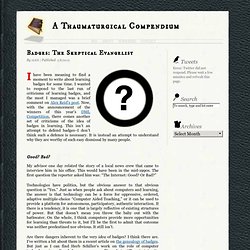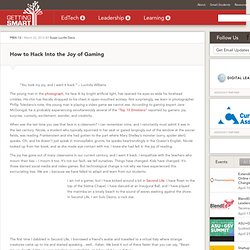

Super Teacher Tools. GamePress. GAMEMOOC Tweetchat 4/10/13. Infographic: About the Gamification of Education. What Video Games Have to Teach Us about Learning. Reflections on Reflections on Badges. There have been a bunch of posts from really smart people reflecting on badges over the past month, leading up to and following the DML Competition culmination and DML Conference.

There is certainly a dose of skepticism across some of the posts (like here and here), mostly coming back to the question around motivation and rewards. In fact, Mitch Resnick held a session about his motivation-related issues with badges at the DML Conference, but unfortunately the room was so small, that most of us weren’t able to squeeze in, so we formed an Occupy Badges makeshift session to talk about badges ourselves.
After getting an update on Mitch’s session and catching up on some of the posts, the common concern is around introducing badges as extrinsic rewards into learning experiences where intrinsic motivations may be at play, and potentially disrupting a delicate balance of motivations or existing interest-driven learning. On intrinsic vs extrinsic motivations: Towards a Comprehensive Understanding of Badging Systems: A Participatory Draft. Badges: The Skeptical Evangelist. I have been meaning to find a moment to write about learning badges for some time.

I wanted to respond to the last run of criticisms of learning badges, and the most I managed was a brief comment on Alex Reid’s post. Now, with the announcement of the winners of this year’s DML Competition, there comes another set of criticisms of the idea of badges in learning. This isn’t an attempt to defend badges–I don’t think such a defence is necessary. It is instead an attempt to understand why they are worthy of such easy dismissal by many people. Good? My advisor one day related the story of a local news crew that came to interview him in his office.
Technologies have politics, but the obvious answer to that obvious question is “Yes.” Are there dangers inherent to the very idea of badges? Ultimately, what is so confusing to me is that I agree wholeheartedly with many of the critics of badges, and reach different conclusions. Over the last year, I’ve used badges to such positive ends. Gold Stars. Gaining Some Perspective on Badges for Lifelong Learning.
I first read about the idea of Open Badges back in the middle of last year.

It excited me. One thing I’ve always been interested in is how to shift the power dynamic within classrooms towards learners in a positive way. Changing (or at least providing additional) ways for students to demonstrate their knowledge, skills and understanding is one way to do that. Using Mozilla’s Open Badges infrastructure, any organization or community can issue badges backed by their own seal of approval. Learners and users can then collect badges from different sources and display them across the web—on their resume, web site, social networking profiles, job sites or just about anywhere. In a previous post on DMLcentral I tried to reframe the debate around badges by showing that we do, in fact, have a problem with assessment -- and education more generally.
Getting Practical (and Visual) The Importance of Context Applying badges to existing learning and teaching scenarios is relatively unproblematic. How to Hack Into the Joy of Gaming. “You took my joy, and I want it back.” – Lucinda Williams The young man in the photograph, his face lit by bright artificial light, has opened his eyes so wide his forehead crinkles.

His chin has literally dropped to his chest in open-mouthed ecstasy. Not surprisingly, we learn in photographer Phillip Toledano’s note, the young man is playing a video game we cannot see. According to gaming expert Jane McGonigal, he is probably experiencing simultaneously several of the “Top 10 Emotions” reported by gamers: joy, surprise, curiosity, excitement, wonder, and creativity. When was the last time you saw that face in a classroom? The joy has gone out of many classrooms in our current century, and I want it back. I am not a gamer, but I have kicked around a bit in Second Life.
The first time I dabbled in Second Life, I borrowed a friend’s avatar and travelled to a virtual Italy where strange creatures came up to me and started speaking…well…Italian. Hack#1: Derring-do Hack #2: Questing.